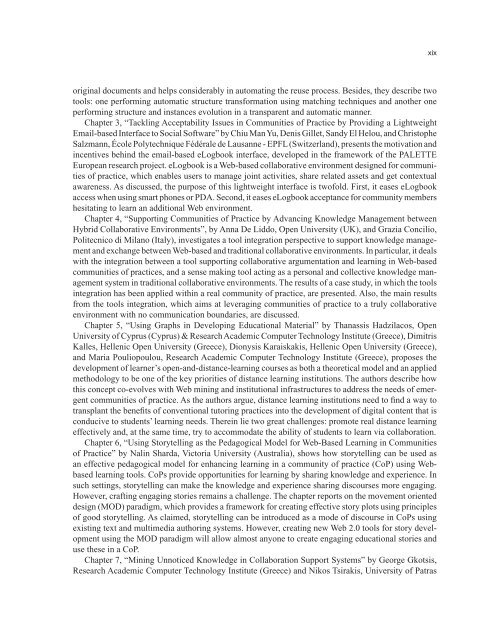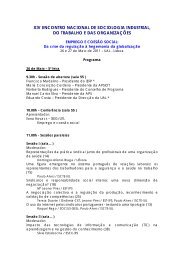Web-based Learning Solutions for Communities of Practice
Web-based Learning Solutions for Communities of Practice
Web-based Learning Solutions for Communities of Practice
You also want an ePaper? Increase the reach of your titles
YUMPU automatically turns print PDFs into web optimized ePapers that Google loves.
original documents and helps considerably in automating the reuse process. Besides, they describe two<br />
tools: one per<strong>for</strong>ming automatic structure trans<strong>for</strong>mation using matching techniques and another one<br />
per<strong>for</strong>ming structure and instances evolution in a transparent and automatic manner.<br />
Chapter 3, “Tackling Acceptability Issues in <strong>Communities</strong> <strong>of</strong> <strong>Practice</strong> by Providing a Lightweight<br />
Email-<strong>based</strong> Interface to Social S<strong>of</strong>tware” by Chiu Man Yu, Denis Gillet, Sandy El Helou, and Christophe<br />
Salzmann, École Polytechnique Fédérale de Lausanne - EPFL (Switzerland), presents the motivation and<br />
incentives behind the email-<strong>based</strong> eLogbook interface, developed in the framework <strong>of</strong> the PALETTE<br />
European research project. eLogbook is a <strong>Web</strong>-<strong>based</strong> collaborative environment designed <strong>for</strong> communities<br />
<strong>of</strong> practice, which enables users to manage joint activities, share related assets and get contextual<br />
awareness. As discussed, the purpose <strong>of</strong> this lightweight interface is tw<strong>of</strong>old. First, it eases eLogbook<br />
access when using smart phones or PDA. Second, it eases eLogbook acceptance <strong>for</strong> community members<br />
hesitating to learn an additional <strong>Web</strong> environment.<br />
Chapter 4, “Supporting <strong>Communities</strong> <strong>of</strong> <strong>Practice</strong> by Advancing Knowledge Management between<br />
Hybrid Collaborative Environments”, by Anna De Liddo, Open University (UK), and Grazia Concilio,<br />
Politecnico di Milano (Italy), investigates a tool integration perspective to support knowledge management<br />
and exchange between <strong>Web</strong>-<strong>based</strong> and traditional collaborative environments. In particular, it deals<br />
with the integration between a tool supporting collaborative argumentation and learning in <strong>Web</strong>-<strong>based</strong><br />
communities <strong>of</strong> practices, and a sense making tool acting as a personal and collective knowledge management<br />
system in traditional collaborative environments. The results <strong>of</strong> a case study, in which the tools<br />
integration has been applied within a real community <strong>of</strong> practice, are presented. Also, the main results<br />
from the tools integration, which aims at leveraging communities <strong>of</strong> practice to a truly collaborative<br />
environment with no communication boundaries, are discussed.<br />
Chapter 5, “Using Graphs in Developing Educational Material” by Thanassis Hadzilacos, Open<br />
University <strong>of</strong> Cyprus (Cyprus) & Research Academic Computer Technology Institute (Greece), Dimitris<br />
Kalles, Hellenic Open University (Greece), Dionysis Karaiskakis, Hellenic Open University (Greece),<br />
and Maria Pouliopoulou, Research Academic Computer Technology Institute (Greece), proposes the<br />
development <strong>of</strong> learner’s open-and-distance-learning courses as both a theoretical model and an applied<br />
methodology to be one <strong>of</strong> the key priorities <strong>of</strong> distance learning institutions. The authors describe how<br />
this concept co-evolves with <strong>Web</strong> mining and institutional infrastructures to address the needs <strong>of</strong> emergent<br />
communities <strong>of</strong> practice. As the authors argue, distance learning institutions need to find a way to<br />
transplant the benefits <strong>of</strong> conventional tutoring practices into the development <strong>of</strong> digital content that is<br />
conducive to students’ learning needs. Therein lie two great challenges: promote real distance learning<br />
effectively and, at the same time, try to accommodate the ability <strong>of</strong> students to learn via collaboration.<br />
Chapter 6, “Using Storytelling as the Pedagogical Model <strong>for</strong> <strong>Web</strong>-Based <strong>Learning</strong> in <strong>Communities</strong><br />
<strong>of</strong> <strong>Practice</strong>” by Nalin Sharda, Victoria University (Australia), shows how storytelling can be used as<br />
an effective pedagogical model <strong>for</strong> enhancing learning in a community <strong>of</strong> practice (CoP) using <strong>Web</strong><strong>based</strong><br />
learning tools. CoPs provide opportunities <strong>for</strong> learning by sharing knowledge and experience. In<br />
such settings, storytelling can make the knowledge and experience sharing discourses more engaging.<br />
However, crafting engaging stories remains a challenge. The chapter reports on the movement oriented<br />
design (MOD) paradigm, which provides a framework <strong>for</strong> creating effective story plots using principles<br />
<strong>of</strong> good storytelling. As claimed, storytelling can be introduced as a mode <strong>of</strong> discourse in CoPs using<br />
existing text and multimedia authoring systems. However, creating new <strong>Web</strong> 2.0 tools <strong>for</strong> story development<br />
using the MOD paradigm will allow almost anyone to create engaging educational stories and<br />
use these in a CoP.<br />
Chapter 7, “Mining Unnoticed Knowledge in Collaboration Support Systems” by George Gkotsis,<br />
Research Academic Computer Technology Institute (Greece) and Nikos Tsirakis, University <strong>of</strong> Patras<br />
xix



